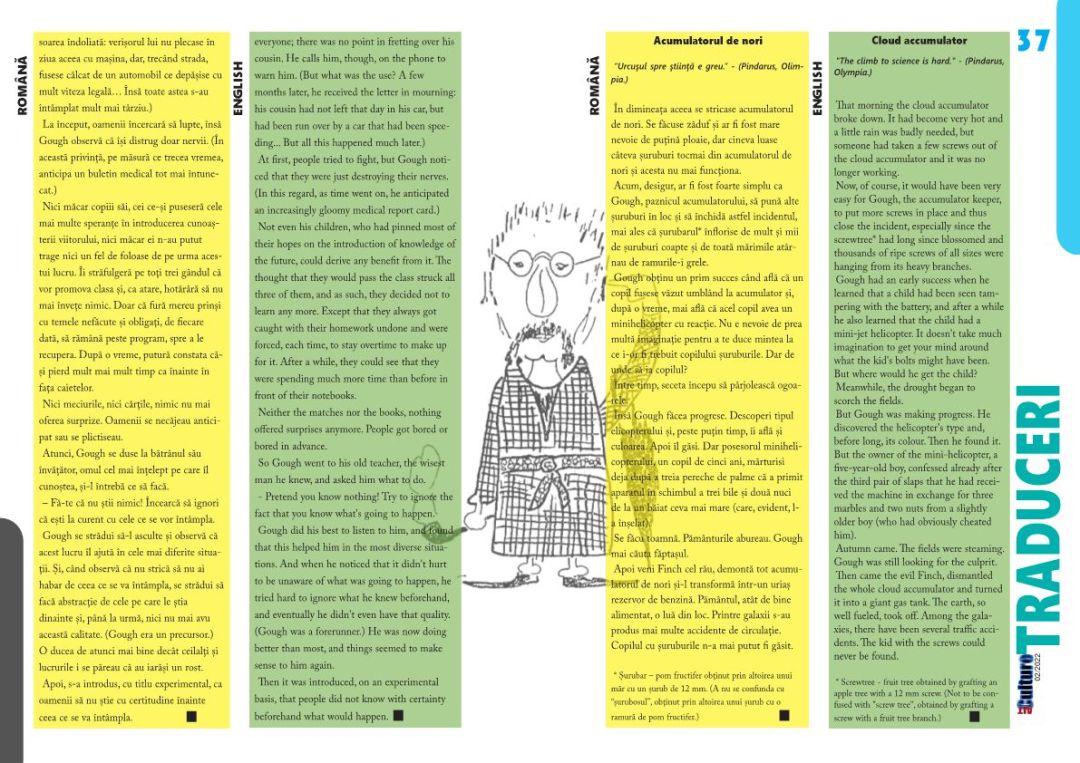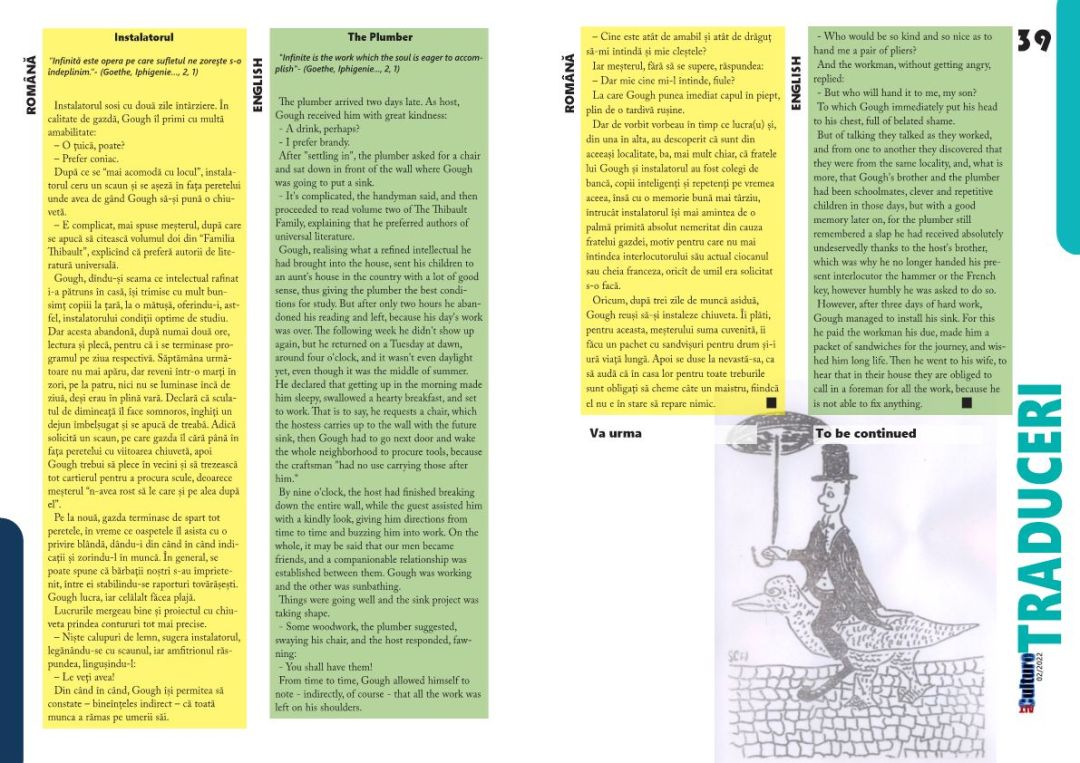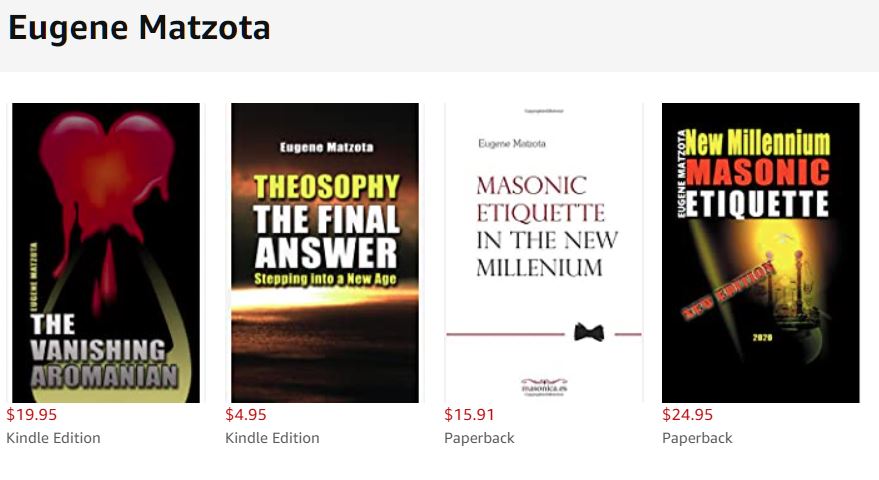POOLOURI adică Paranoia Schwartz (VIII)
De Gheorghe Schwartz
Tradus de / Translated by
Eugen / Eugene MATZOTA
ECOULTOUR le mulțumește tuturor celor care sunt alături în lupta pentru educație și cultură!
POOLOURI
adică
Paranoia Schwartz
sau
pildele cele mai însemnate din viața plină de învățăminte și îndrăzneală a preacinstitului și prealuminatului Gough, precum și a nu mai puțin strălucitului său contemporan Finch, cu precizări asupra modului în care înțelepții de ieri, de alaltăieri și dintotdeauna au știut să răsfrîngă aceste întâmplări în subtilele lor maxime și cugetări. Și asta nu este încă nici pe departe totul…

Aparatul de ghicit viitorul
“Veţi fi ca zeii, ştiind binele şi răul”. – (Septuaginta, Gen. 3, 5.).rinse pe Joel.” – Truman Capote, Alte glasuri, alte încăperi, II, 7.
– O! De-aş fi ştiut dinainte!…
S-a auzit de prea multe ori această frază, aşa că s-a introdus – cu titlu experimental – ca oamenii să ştie cu exactitate ce se va întâmpla cu ei în continuare.
Pe Gough această noutate l-a surprins cu totul nepregătit. Tocmai îşi punea galoşii, când îl străfulgeră gândul că după masă va fi un soare plăcut, însă că va regreta acest lucru. Aşa că îşi lăsă galoşii acasă şi, până la amiază, răci zdravăn. Şi bineînţeles că regretă.
Finch, în schimb, află că va pierde meciul prin K.O., aşa că primi resemnat regretele amicilor în cabină. Boxase mai timorat ca oricând, dar ce să fi făcut? Trebuise să urce în ring.
Gough simţi că nu poate lua lucrurile atât de uşor. El era pătruns de simţul răspunderii, era tată a trei copii, lucrase din greu pentru situaţia la care ajunsese. Acum, că i se oferea şansa de a şti ce i se va întâmpla în continuare, trebuia să fie de zece ori mai vigilent. Şi alţii aveau această şansă.
Hotărî s-o ia metodic: anticipă mersul pieţii, dar, până la urmă, cumpărăturile zilnice tot ca de obicei trebui să le facă, adică de atât de cât avea nevoie. Şi ce dacă ştia că pâinea se va scumpi. Nu putu să cumpere pâine pentru o lună înainte. Se căzni mult, dar sfârşi prin a trebui să abandoneze orice proiect de a trage foloase de pe urma aflării acestei ştiri. Apoi îşi bătu capul cum ar putea profita într-adevăr: evenimente erau puţine în viaţa sa şi nu se anunţau mai multe nici pentru anul următor (anticiparea viitorului fusese introdusă vizând mereu doar câte un an). E drept, un verişor va avea un accident mortal de maşină, dar facultatea de a anticipa le fusese dată tuturor; n-avea rost să se agite şi pentru verişorul lui. Îl sună, totuşi, la telefon pentru a-l preveni. (Dar ce folos? Peste câteva luni primi scrisoarea îndoliată: verişorul lui nu plecase în ziua aceea cu maşina, dar, trecând strada, fusese călcat de un automobil ce depăşise cu mult viteza legală… Însă toate astea s-au întâmplat mult mai târziu.)
La început, oamenii încercară să lupte, însă Gough observă că îşi distrug doar nervii. (În această privinţă, pe măsură ce trecea vremea, anticipa un buletin medical tot mai întunecat.)
Nici măcar copiii săi, cei ce-şi puseseră cele mai multe speranţe în introducerea cunoaşterii viitorului, nici măcar ei n-au putut trage nici un fel de foloase de pe urma acestui lucru. Îi străfulgeră pe toţi trei gândul că vor promova clasa şi, ca atare, hotărâră să nu mai înveţe nimic. Doar că fură mereu prinşi cu temele nefăcute şi obligaţi, de fiecare dată, să rămână peste program, spre a le recupera. După o vreme, putură constata că-şi pierd mult mai mult timp ca înainte în faţa caietelor.
Nici meciurile, nici cărţile, nimic nu mai oferea surprize. Oamenii se necăjeau anticipat sau se plictiseau.
Atunci, Gough se duse la bătrânul său învăţător, omul cel mai înţelept pe care îl cunoştea, şi-l întrebă ce să facă.
– Fă-te că nu ştii nimic! Încearcă să ignori că eşti la curent cu cele ce se vor întâmpla.
Gough se strădui să-l asculte şi observă că acest lucru îl ajută în cele mai diferite situaţii. Şi, când observă că nu strică să nu ai habar de ceea ce se va întâmpla, se strădui să facă abstracţie de cele pe care le ştia dinainte şi, până la urmă, nici nu mai avu această calitate. (Gough era un precursor.) O ducea de atunci mai bine decât ceilalţi şi lucrurile i se păreau că au iarăşi un rost.
Apoi, s-a introdus, cu titlu experimental, ca oamenii să nu ştie cu certitudine înainte ceea ce se va întâmpla.
POOLOs
namely
Schwartz Paranoia
or
the most important parables of the life full of learning and boldness of the pre-eminent and pre-enlightened Gough, as well as of his no less brilliant contemporary Finch, with details on how the sages of yesterday, of the other day and always knew how to reflect these events in their maxims and thoughts. And that’s not all yet…
The Fortune Teller Machine
„You will be like the gods, knowing good and evil” – (Septuagint, Gen. 3, 5.)He clasped his hands in his hair and began to shoot, and then a terrible, incomprehensible rage seized Joel.” – Truman Capote, Other Voices, Other Rooms, II, 7.)
O! If only I had known beforehand!…
This phrase has been heard too many times, so it was introduced – on an experimental basis – for people to know exactly what would happen to them next.
Gough was completely unprepared for this novelty. He was just putting on his galoshes when he was struck by the thought that it would be pleasantly sunny after lunch, but that he would regret it. So he left his galoshes at home and had a cold by midday. And, of course, he regretted it.
On the other hand, Finch learns that he will lose the match by a knockout, so he resignedly welcomed the regrets of his mates into the cabin. He boxed timider than ever, but what could he have done? He had to get in the ring.
Gough felt he couldn’t take things so lightly. He was imbued with a sense of responsibility, he was a father of three, he had worked hard for the situation he had arrived at. Now that he was being offered the chance to know what would happen to him next, he had to be ten times more vigilant. Others had that chance too.
He decided to take it methodically: he anticipated the market, but, in the end, the daily shopping was still as usual, that is, as much as he needed. So what if he knew that bread would get more expensive. He couldn’t buy bread for a month beforehand. He struggled, but ended up having to abandon any plans to profit from the news. Then he wondered how he could really profit: events were few in his life, and there were not many more to come in the next year (anticipation of the future had always been introduced, always aimed at one year). True, a cousin was going to have a fatal car accident, but the faculty of anticipation had been given to everyone; there was no point in fretting over his cousin. He calls him, though, on the phone to warn him. (But what was the use? A few months later, he received the letter in mourning: his cousin had not left that day in his car, but had been run over by a car that had been speeding… But all this happened much later.)
At first, people tried to fight, but Gough noticed that they were just destroying their nerves. (In this regard, as time went on, he anticipated an increasingly gloomy medical report card.)
Not even his children, who had pinned most of their hopes on the introduction of knowledge of the future, could derive any benefit from it. The thought that they would pass the class struck all three of them, and as such, they decided not to learn any more. Except that they always got caught with their homework undone and were forced, each time, to stay overtime to make up for it. After a while, they could see that they were spending much more time than before in front of their notebooks.
Neither the matches nor the books, nothing offered surprises anymore. People got bored or bored in advance.
So Gough went to his old teacher, the wisest man he knew, and asked him what to do.
Pretend you know nothing! Try to ignore the fact that you know what’s going to happen.
Gough did his best to listen to him, and found that this helped him in the most diverse situations. And when he noticed that it didn’t hurt to be unaware of what was going to happen, he tried hard to ignore what he knew beforehand, and eventually he didn’t even have that quality. (Gough was a forerunner.) He was now doing better than most, and things seemed to make sense to him again.
Then it was introduced, on an experimental basis, that people did not know with certainty beforehand what would happen.

Acumulatorul de nori
“Urcuşul spre ştiinţă e greu.” – (Pindarus, Olimpia.)
În dimineaţa aceea se stricase acumulatorul de nori. Se făcuse zăduf şi ar fi fost mare nevoie de puţină ploaie, dar cineva luase câteva şuruburi tocmai din acumulatorul de nori şi acesta nu mai funcţiona.
Acum, desigur, ar fi fost foarte simplu ca Gough, paznicul acumulatorului, să pună alte şuruburi în loc şi să închidă astfel incidentul, mai ales că şurubarul* înflorise de mult şi mii de şuruburi coapte şi de toată mărimile atârnau de ramurile-i grele.
Gough obţinu un prim succes când află că un copil fusese văzut umblând la acumulator şi, după o vreme, mai află că acel copil avea un minihelicopter cu reacţie. Nu e nevoie de prea multă imaginaţie pentru a te duce mintea la ce i-or fi trebuit copilului şuruburile. Dar de unde să ia copilul?
Între timp, seceta începu să pârjolească ogoarele.
Însă Gough făcea progrese. Descoperi tipul elicopterului şi, peste puţin timp, îi află şi culoarea. Apoi îl găsi. Dar posesorul minihelicopterului, un copil de cinci ani, mărturisi deja după a treia pereche de palme că a primit aparatul în schimbul a trei bile şi două nuci de la un băiat ceva mai mare (care, evident, l-a înşelat).
Se făcu toamnă. Pământurile abureau. Gough mai căuta făptaşul.
Apoi veni Finch cel rău, demontă tot acumulatorul de nori şi-l transformă într-un uriaş rezervor de benzină. Pământul, atât de bine alimentat, o luă din loc. Printre galaxii s-au produs mai multe accidente de circulaţie. Copilul cu şuruburile n-a mai putut fi găsit.
- Şurubar – pom fructifer obţinut prin altoirea unui măr cu un şurub de 12 mm. (A nu se confunda cu “şurubosul”, obţinut prin altoirea unui şurub cu o ramură de pom fructifer.)
Cloud accumulator
„The climb to science is hard.” – (Pindarus, Olympia.)
That morning the cloud accumulator broke down. It had become very hot and a little rain was badly needed, but someone had taken a few screws out of the cloud accumulator and it was no longer working.
Now, of course, it would have been very easy for Gough, the accumulator keeper, to put more screws in place and thus close the incident, especially since the screwtree* had long since blossomed and thousands of ripe screws of all sizes were hanging from its heavy branches.
Gough had an early success when he learned that a child had been seen tampering with the battery, and after a while he also learned that the child had a mini-jet helicopter. It doesn’t take much imagination to get your mind around what the kid’s bolts might have been. But where would he get the child?
Meanwhile, the drought began to scorch the fields.
But Gough was making progress. He discovered the helicopter’s type and, before long, its colour. Then he found it. But the owner of the mini-helicopter, a five-year-old boy, confessed already after the third pair of slaps that he had received the machine in exchange for three marbles and two nuts from a slightly older boy (who had obviously cheated him).
Autumn came. The fields were steaming. Gough was still looking for the culprit.
Then came the evil Finch, dismantled the whole cloud accumulator and turned it into a giant gas tank. The earth, so well fueled, took off. Among the galaxies, there have been several traffic accidents. The kid with the screws could never be found.
- Screwtree – fruit tree obtained by grafting an apple tree with a 12 mm screw. (Not to be confused with „screw tree”, obtained by grafting a screw with a fruit tree branch.)

Instalatorul
“Infinită este opera pe care sufletul ne zoreşte s-o îndeplinim.”- (Goethe, Iphigenie…, 2, 1)
Instalatorul sosi cu două zile întârziere. În calitate de gazdă, Gough îl primi cu multă amabilitate:
– O ţuică, poate?
– Prefer coniac.
După ce se “mai acomodă cu locul”, instalatorul ceru un scaun şi se aşeză în faţa peretelui unde avea de gând Gough să-şi pună o chiuvetă.
– E complicat, mai spuse meşterul, după care se apucă să citească volumul doi din “Familia Thibault”, explicînd că preferă autorii de literatură universală.
Gough, dîndu-şi seama ce intelectual rafinat i-a pătruns în casă, îşi trimise cu mult bun-simţ copiii la ţară, la o mătuşă, oferindu-i, astfel, instalatorului condiţii optime de studiu. Dar acesta abandonă, după numai două ore, lectura şi plecă, pentru că i se terminase programul pe ziua respectivă. Săptămâna următoare nu mai apăru, dar reveni într-o marţi în zori, pe la patru, nici nu se luminase încă de ziuă, deşi erau în plină vară. Declară că sculatul de dimineaţă îl face somnoros, înghiţi un dejun îmbelşugat şi se apucă de treabă. Adică solicită un scaun, pe care gazda îl cără până în faţa peretelui cu viitoarea chiuvetă, apoi Gough trebui să plece în vecini şi să trezească tot cartierul pentru a procura scule, deoarece meşterul “n-avea rost să le care şi pe alea după el”.
Pe la nouă, gazda terminase de spart tot peretele, în vreme ce oaspetele îl asista cu o privire blândă, dându-i din când în când indicaţii şi zorindu-l în muncă. În general, se poate spune că bărbaţii noştri s-au împrietenit, între ei stabilindu-se raporturi tovărăşeşti. Gough lucra, iar celălalt făcea plajă.
Lucrurile mergeau bine şi proiectul cu chiuveta prindea contururi tot mai precise.
– Nişte calupuri de lemn, sugera instalatorul, legănându-se cu scaunul, iar amfitrionul răspundea, linguşindu-l:
– Le veţi avea!
Din când în când, Gough îşi permitea să constate – bineînţeles indirect – că toată munca a rămas pe umerii săi.
– Cine este atât de amabil şi atât de drăguţ să-mi întindă şi mie cleştele?
Iar meşterul, fără să se supere, răspundea:
– Dar mie cine mi-l întinde, fiule?
La care Gough punea imediat capul în piept, plin de o tardivă ruşine.
Dar de vorbit vorbeau în timp ce lucra(u) şi, din una în alta, au descoperit că sunt din aceeaşi localitate, ba, mai mult chiar, că fratele lui Gough şi instalatorul au fost colegi de bancă, copii inteligenţi şi repetenţi pe vremea aceea, însă cu o memorie bună mai târziu, întrucât instalatorul îşi mai amintea de o palmă primită absolut nemeritat din cauza fratelui gazdei, motiv pentru care nu mai întindea interlocutorului său actual ciocanul sau cheia franceza, oricît de umil era solicitat s-o facă.
Oricum, după trei zile de muncă asiduă, Gough reuşi să-şi instaleze chiuveta. Îi plăti, pentru aceasta, meşterului suma cuvenită, îi făcu un pachet cu sandvişuri pentru drum şi-i ură viaţă lungă. Apoi se duse la nevastă-sa, ca să audă că în casa lor pentru toate treburile sunt obligaţi să cheme câte un maistru, fiindcă el nu e în stare să repare nimic.
The Plumber
„Infinite is the work which the soul is eager to accomplish”- (Goethe, Iphigenie…, 2, 1)
The plumber arrived two days late. As host, Gough received him with great kindness:
- A drink, perhaps?
- I prefer brandy.
After „settling in”, the plumber asked for a chair and sat down in front of the wall where Gough was going to put a sink. - It’s complicated, the handyman said, and then proceeded to read volume two of The Thibault Family, explaining that he preferred authors of universal literature.
Gough, realising what a refined intellectual he had brought into the house, sent his children to an aunt’s house in the country with a lot of good sense, thus giving the plumber the best conditions for study. But after only two hours he abandoned his reading and left, because his day’s work was over. The following week he didn’t show up again, but he returned on a Tuesday at dawn, around four o’clock, and it wasn’t even daylight yet, even though it was the middle of summer. He declared that getting up in the morning made him sleepy, swallowed a hearty breakfast, and set to work. That is to say, he requests a chair, which the hostess carries up to the wall with the future sink, then Gough had to go next door and wake the whole neighborhood to procure tools, because the craftsman „had no use carrying those after him.”
By nine o’clock, the host had finished breaking down the entire wall, while the guest assisted him with a kindly look, giving him directions from time to time and buzzing him into work. On the whole, it may be said that our men became friends, and a companionable relationship was established between them. Gough was working and the other was sunbathing.
Things were going well and the sink project was taking shape. - Some woodwork, the plumber suggested, swaying his chair, and the host responded, fawning:
- You shall have them!
From time to time, Gough allowed himself to note – indirectly, of course – that all the work was left on his shoulders. - Who would be so kind and so nice as to hand me a pair of pliers?
And the workman, without getting angry, replied: - But who will hand it to me, my son?
To which Gough immediately put his head to his chest, full of belated shame.
But of talking they talked as they worked, and from one to another they discovered that they were from the same locality, and, what is more, that Gough’s brother and the plumber had been schoolmates, clever and repetitive children in those days, but with a good memory later on, for the plumber still remembered a slap he had received absolutely undeservedly thanks to the host’s brother, which was why he no longer handed his present interlocutor the hammer or the French key, however humbly he was asked to do so.
However, after three days of hard work, Gough managed to install his sink. For this he paid the workman his due, made him a packet of sandwiches for the journey, and wished him long life. Then he went to his wife, to hear that in their house they are obliged to call in a foreman for all the work, because he is not able to fix anything.






